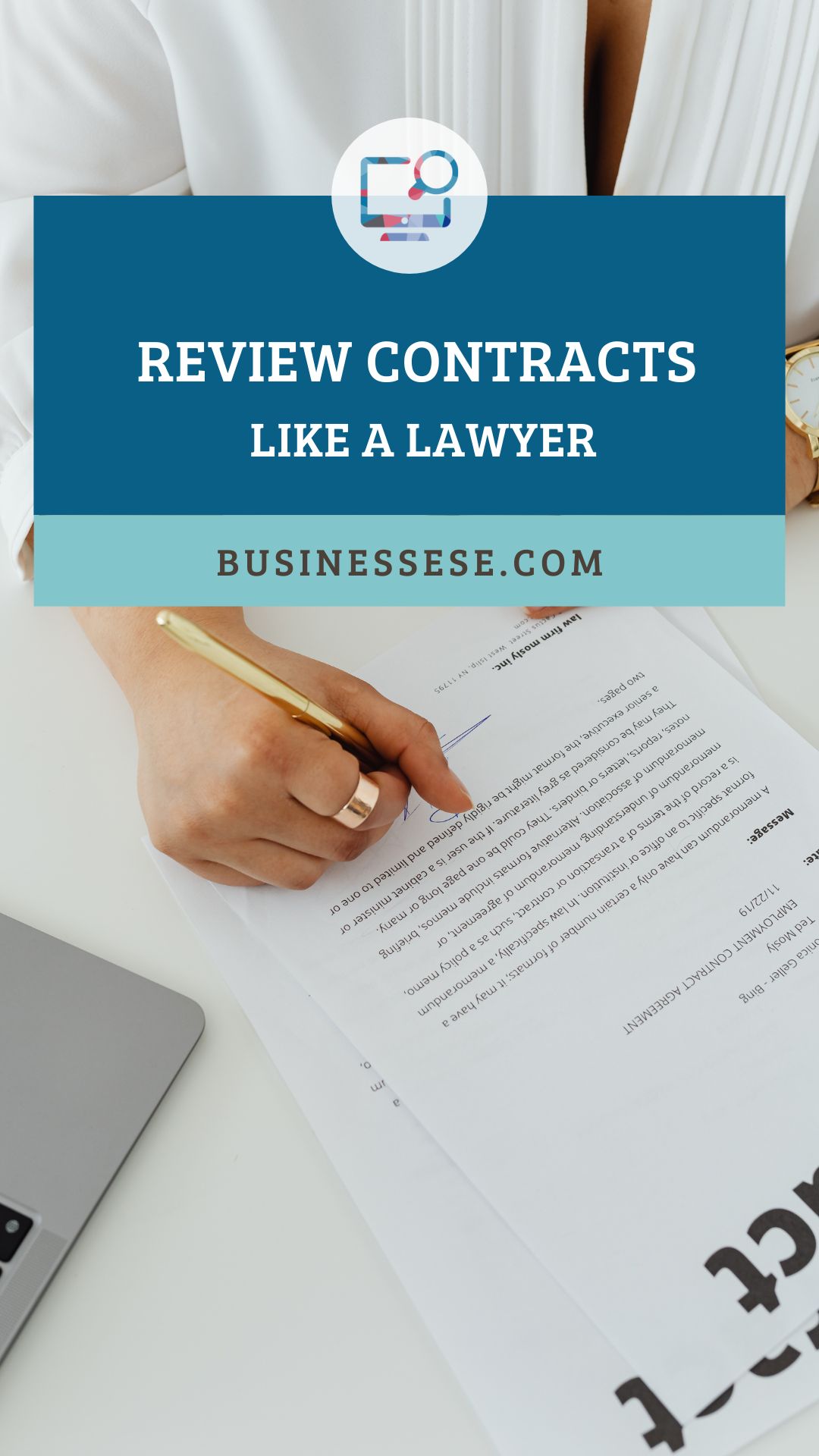Introduction
Welcome to the Simplifying Legal podcast, brought to you by Businessese. I’m your host, Danielle Liss.
Many years ago, someone told me I was the least lawyer-y lawyer she’d ever met because I helped make legal easier to understand. To this day, it’s one of the best compliments I’ve received in my professional life.
If you’ve ever felt legal was too scary, too overwhelming, too complicated, or just plain incomprehensible, you’re not alone. The Simplifying Legal podcast was created to help.
In each episode, we’ll do a deep dive into a legal topic and give you concrete next steps so you can apply it to your business.
My goal is for you to walk away from each episode thinking, oh, that was easier than I thought it would be.
Let’s get started.
Episode Content
Hey there, I’m Danielle. Welcome to Episode 57 of Simplifying Legal for Small Business Owners.
Before I dive in, I wanted to let you know that the podcast will be going on hiatus for a bit after this episode. We’re working on some really exciting things for Businessese and we’ll be concentrating on that for the next few months. I anticipate we’ll be back with new episodes in July, possibly August. Make sure you have subscribed so you’ll be notified when a new episode drops.
Okay, now let’s get into the episode. Today, I’m talking about how to review contracts like a lawyer.
Disclaimer: As always, before we get into today’s topic, a quick disclaimer. This podcast is meant to provide you with legal information only. It’s not legal advice and doesn’t create any type of attorney-client relationship between us. Please don’t take any action without consulting your lawyer first.
Through Liss Legal, I do a lot of contract reviews for my clients. And, it really covers a wide range, depending on the client’s business.
For example, I look at a lot of agreements produced by potential service providers. For bloggers and influencers, there are a lot of sponsored content agreements. Software agreements. Licensing agreements. Even settlement agreements when there are disputes. And, even though the agreements are all very different, I usually tackle them with the same set of steps.
My clients frequently say the same things. They don’t like dealing with contracts and they feel nervous because they are worried they aren’t going to know how to read them. And that fear usually means that they procrastinate or get really anxious about the agreements.
If this sounds familiar and you don’t like handling contracts and you want to work directly with your lawyer on contract review, you can skip the rest of this episode. But, if you want to feel more comfortable reading contracts, I’m going to share the steps I use when reviewing contracts.
Outline Your Expectations
The first step in your contract review is for you to outline your expectations. And, don’t worry, this isn’t something overly formal. You can write or type an outline or have something in your head. Whatever helps you put together your thoughts about the agreement before you start reading it.
There are two main areas I want you to consider when you are outlining your expectations and they are:
- your prior contract discussions and
- your overall contract strategy.
Prior Contract Discussions
First, let’s talk about the prior contract discussions.
Most contracts don’t come out of the blue. You’re typically going to have conversations with someone and the contract is then sent to memorialize your understanding and set out the terms of the relationship. Sometimes, you’ll have extensive discussions before the agreement is ever sent. You may even agree to a proposal ahead of time, depending on the type of agreement you’re reviewing.
At the outlining stage, consider the most important parts of those prior discussions. Here are some questions you can consider:
- What important terms did you discuss?
- What do you expect to see for payments or compensation?
- What services should be included in the scope of work?
- Were there any specific things that really stood out that you want to make sure are included?
Depending on how extensive your prior discussions were, you may have a number of things to include in your outline. These are all things that you should be expecting to see reflected in the agreement once you start reading through it.
Consider Your Contract Strategy
Once you’ve considered the prior discussions and you have that portion of the outline completed, think about your overall contract strategy.
If you haven’t listened to the last episode, I definitely recommend that you check it out since it’s all about how to create a contract strategy.
As part of your contract strategy, you’ll know the types of terms that you want in your agreements. Those are things that you’ll want to include in your outline to make sure they are there.
Your contract strategy may also set out the types of terms you won’t agree to. In that case, you’ll want to remember which terms you have on that list so you can ensure they aren’t in the agreement.
Initial Review and Comments
After you consider the prior discussions and your contract strategy, you should have the information you need to make an outline that you can work from. I find these outlines particularly important because it makes the next step so much easier.
Once the outline is done, step two is to complete an initial review of the contract and add comments to the document.
How you complete this will really depend on your personal preference. I do almost everything electronically, and I strongly prefer to use a word doc for contract review, but a google doc will also work. But, there are definitely times when I’ve had a particularly dense agreement that I’ve printed so I can highlight and make written notes for myself.
I consider this step to be the initial read of the document. I’m usually making comments for myself. It might be things I notice while reading that don’t match my outlined expectations or questions that I have.
Because this is just your initial read of the document, don’t get into heavy revisions yet. I say this because you want to know more about how the document is structured. You may review a paragraph and say, oh, it doesn’t say this thing that I want, so I’m going to make a revision. But, then you may find it is addressed in a later paragraph. No need to potentially waste time on revising when it might appear at some point.
Instead of doing the revisions right away, make a comment for yourself to come back and change it if you don’t see the expected item addressed later in the agreement.
This step is all about making sure that the basic items you outlined are there and expressed how you would expect to see them. If you see something off, make a comment, then you can come back to it.
For example, let’s say that you’re hiring a designer and you believed you would be paying $1,000, which included any stock photography. But, then you get the agreement and you discover that you will need to also purchase a stock library membership. That’s something to add a comment to so you can go back and request clarification or a revision.
This is also the stage where you may add comments for yourself if something doesn’t make sense or is so heavy with legalese that you want to make sure you have a firmer understanding of it. Since this is just the initial pass, flag the section and come back to it in the next step.
Review and Revise
Step 3 is the more thorough review. Since you’ve already done the first review, you generally know what is in the agreement. Now, you’ll do a really careful read to make sure you are in alignment with all of the terms.
This is usually the step where you are going to send back a version of the agreement to the other party. So you will potentially add comments when you have questions or need clarification. Or, you may send over revisions.
How you handle the revisions may be more dependent on the format for your document review. Usually, if it’s a word document, you’ll use the track changes to note the revisions. You may also hear people refer to this as a redline of the document. You can also add comments in a Word document.
For google docs, you can use the suggestions option so it’s easy to see what has been changed. Google Docs also makes it easy to add comments.
PDF agreements are a bit more difficult. You can open them in word or a google doc, but you then lose formatting. Some people prefer to highlight things and add comments before sending it back with revisions.
This step is where want to make sure that you’ve addressed anything that doesn’t line up with your outline. Ask questions. Ask for changes. Whatever you need to make yourself feel comfortable.
And, of course, if you flagged any part of the agreement as something you needed to come back to, then make sure that you go back and carefully review the terms. If you aren’t sure, please talk to your lawyer to make sure you are entering terms that you agree with.
Communicate with the Other Party
Once you complete the review and revisions, you’ll need to communicate everything with the other party. Sometimes, this is the part that makes people particularly nervous.
This is where I want to reassure you that requests for revisions or clarifications are a very normal part of the contract process. Please don’t ever get into that mindset where you think ugh, I’m a small business owner and they are much bigger, so I don’t think I can ask for changes. You absolutely can and should do what you need to do to enter the best possible agreements for your business.
In this stage, you’ll ask for revisions and you may go back and forth with the other party a few times to get the language just right. Be patient. Usually, it’s just a matter of discussing and making sure both parties are comfortable with the changes.
Action Steps
Now let’s talk about today’s action steps.
- The first action step is fairly simple: do you want to review your agreements or do you send them to your lawyer? Some of my clients send me absolutely everything. Others only send me the contracts that seem particularly complicated. Your response to this action step may be that it depends. But, it’s a good one to think about so you can determine which contracts you are comfortable with.
- Next, when you are reviewing your agreements, walk through the steps I discussed. First, outline your expectations. Then do an initial pass while making comments. From there, you’ll really get into the detailed reading and requesting any necessary revisions.
- The last thing to consider is how you want to submit requests for revisions. I always recommend sending a marked-up document whenever you can as it’s far easier for the other party to see exactly what is different. But, you can also do a bulleted list or even a call to discuss. The most important thing is to make sure you’ve talked about and resolved any areas of concern or requests for revisions before signing.
- Remember, don’t fear making requests for revisions. The worst thing that can happen is that someone says no. Then you can decide how you’d like to move forward. If you want to look more closely at this topic, in episode 41, I discussed how to handle contract revisions.
Last, as always, if you simply don’t want to review your agreements, please contact your lawyer to discuss their contract review services. I regularly work with clients on contract review through my law firm, Liss Legal, and I’d be happy to see if we would be a good fit to work together. If you’d like to learn more, visit LissLegal.com.
Thanks for joining me for today’s episode of the Simplifying Legal Podcast. Please subscribe if you haven’t already.
I’d love to connect with you outside of the show. Visit Businessese at businessese.com. To find show notes for today’s episode, visit businessese.com/podcast.
If you like the podcast, I’d love it if you give the show a review in Apple Podcasts, Stitcher, or wherever you listen to podcasts.
If you have any questions, you can reach out via email at: [email protected].
Thanks for listening and we’ll continue Simplifying Legal on next week’s episode.







